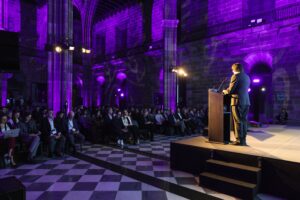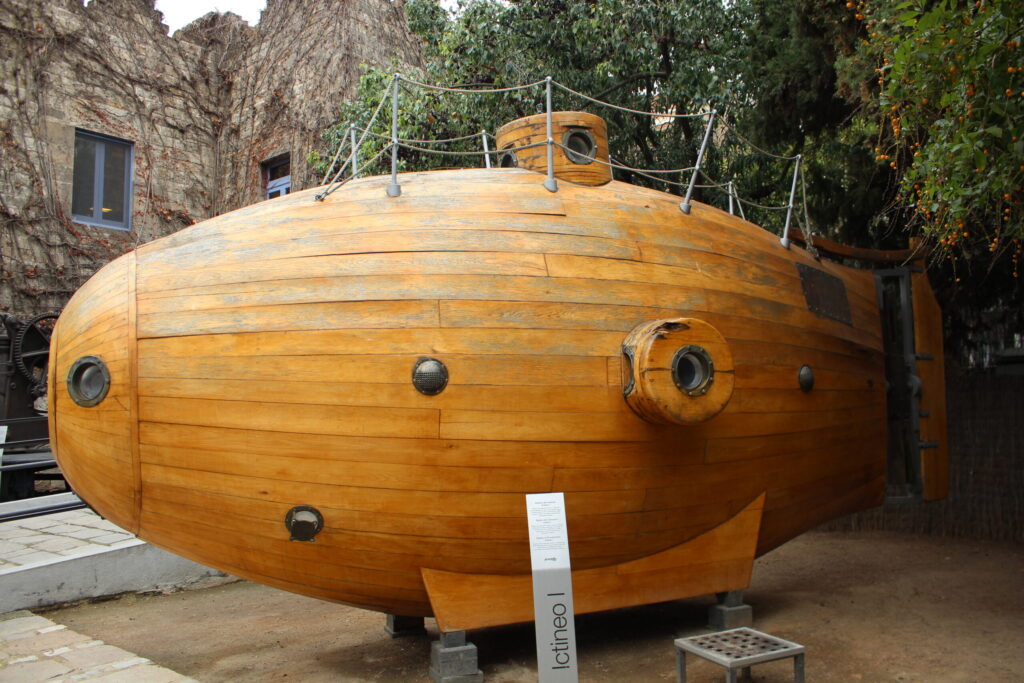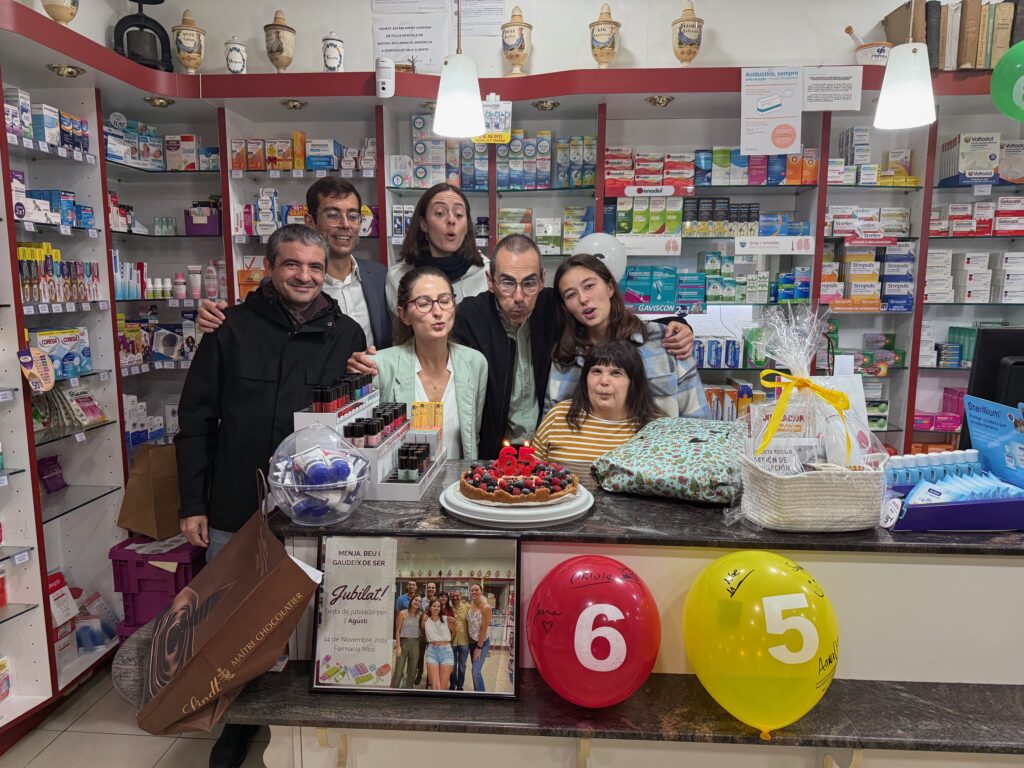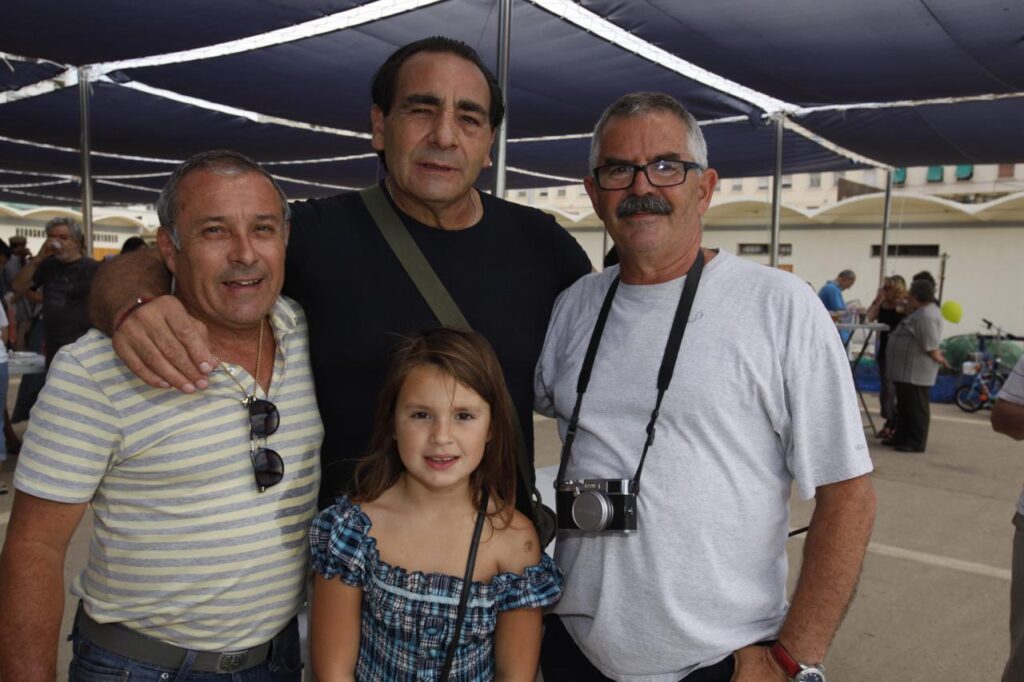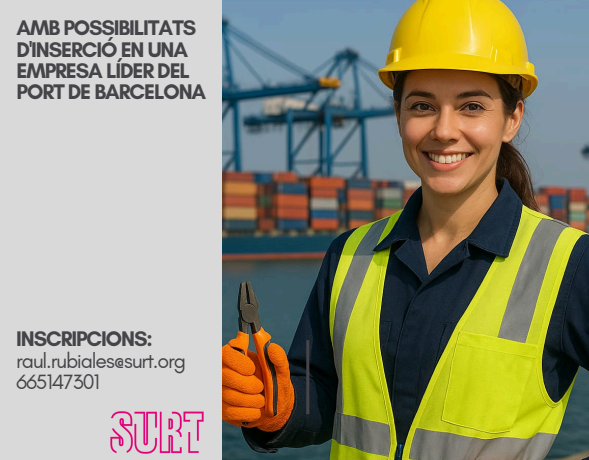Jaume Raventós not only provided us with specific data on how the Hospital del Mar – always our Hospital – will be improved, but he also explained in a very didactic way what care for the elderly is like and where it is heading. We heard him say that one of the great problems of grandparents is loneliness. They were also unaware that the figure of the family doctor, one of the most necessary specialists, is in ‘danger of extinction’ due to a lack of vocation.
Clear and direct. Undoubtedly, he has been very clear about who reads this humble magazine: the people of the neighbourhood. Those who, like their parents and grandparents before them, entrust their health to their hospital: the Hospital del Mar.
New manager for a new phase.
This is my second stay at the Hospital del Mar. I was already here from 2008 to 2011. I know the hospital and I was already familiar with the project for the new hospital, because it started to be planned at the beginning of the century. Now we are in the phase in which it has fortunately reached what I call cruising speed, making notable progress in the construction and remodelling of buildings.
What improvements will the users perceive in the new hospital?
This hospital has been built by and for the patient. And this is not a demagogic statement. The patients themselves were actively involved in the development of the project. In the construction plan for the centre
They have been asked how they wanted the facilities to be and they have participated in the planning of the spaces. Their opinions have been taken into account and implemented. The aim is to create what we call a ‘friendly hospital’.
Let’s be specific. Emergencies?
If we are talking about A&E, there are now more than 100 boxes and 72 personalised care points, also by speciality: traumatology, geriatrics, paediatrics, mental health, etc. This conscious organisation by speciality is a novelty that is of direct benefit to the person admitted. At the same time, all emergencies are concentrated in this centre.
Admissions?
Another substantial improvement is in the area of hospitalisation. That is, what we call beds. All wards, current and new, have improved the rooms, turning them into modern and pleasant spaces where patients and their companions are really comfortable during their stay. We are talking about decoration, furniture, new technologies…
Operations?
We will soon have 2 new operating theatres of what is known as high complexity. In total, we have 4 highly complex operating theatres equipped with the most advanced technology. There has been a very significant investment plan in technology.
Emergency, hospitalisation, operating theatres. Is it all done?
No, we still have to complete the communication plan by 2025. A plan that, by applying information technology, will allow, among other advantages, the accompanying persons to be promptly informed of their patient’s condition, even during their own surgery.
The goal is 2030.
More than a goal, it is a stage, because 2030 is not the end of the line. Then a third phase will begin, in which the building next to it will be inaugurated. Planning work is already underway prior to implementation. The total budget is almost €150m.
Let us not forget the Hope Centre.
Now all its activity will go down in the Hospital del Mar. We have to think of a new plan of uses. I say ‘we’ because we have to work together with the City Council, the owner of the building, CatSalut and Social Rights. Together we must be able to find the most suitable use for the city. It is necessary to rethink the Esperanza Centre.
Will images of patients in the corridors become history?
Barcelona does not need more hospital beds. The trend in health is to spend less and less time in hospital. To go home as soon as possible and to promote what is known as home admission. There are currently surgical interventions that do not require subsequent admission, but outpatient follow-up systems.
The need is in the elderly.
There is a growing elderly population because life expectancy is longer. Many problems of lack of emergency beds or admissions come because there are not enough intermediate care beds that would be more suitable for these geriatric postoperative patients. Patients who need a different treatment than young postoperative patients, but this is not given and they occupy places not indicated for them and necessary for others. This is the bottleneck.
These elderly people could be cared for by relatives at home.
One of the big problems of the elderly is loneliness. They have a family structure that does not give them the cover they need. Human relations between relatives, neighbours, friendships are changing rapidly in our society. Sometimes, you find that the elderly person cannot leave the hospital when they are discharged because they have no one to come and pick them up or to take care of them at home afterwards, which is often simply to supervise their medication.
Very sad.
We are also working on this social aspect. We ask for more resources from the social authorities of the City Council and the Generalitat. It is more a social issue than a health issue, but we cannot ignore it; on the contrary, we encounter it more and more every day. Personally, I think that hospitals should not limit themselves to the ‘health area’ and also get involved in the ‘social area’, because they are closely linked.
Difficult solution.
I think that the tendency will be that for the elderly there will be 3 options: one, to live in your own flat, as long as you are sufficiently autonomous and have solved the aforementioned problem of loneliness; two, to live in co-living: supervised flats and communities of cohabitation with common services; and three, the residence, only for the most dependent people. I see this specialisation as positive, because, for example, an independent person who only goes to the residence to have dinner and sleep with very dependent people is not positive for him/her and occupies a place that is not suitable for him/her.
Changing the subject. Professionals leave for other countries.
They leave because they are well trained and poorly paid. We all know that. But another problem I would like to point out is the tendency towards what I call ‘super-specialisation’
Super-specialisation?
Students want to be super-specialists (SE) but not family doctors. And that figure cannot be lost. The family doctor is the one who identifies the illness and directs you to the corresponding specialist. It is the one who subsequently reviews the treatments, the postoperative period. It is the one who knows you personally and maintains that human and close relationship that is so necessary. It is your point of reference when you feel unwell.
Too many medical series?
I don’t know, but the reality is that being a family doctor has lost its appeal among young students. I think that the faculty does not give it the prominence it deserves and it is better ‘sold’ to the super-specialist.
CURRICULUM
Dr. Jaume Raventós, Manager of the Hospital del Mar
Graduate in Pharmacy from the University of Barcelona and Diploma in Hospital Management from EADA. Master’s Degree in Business Management and Administration (MBA) from EADA. He has an extensive professional career, which began at the hospitals of Puigcerdà and Granollers. He has been Managing Director at the hospitals of San Bernabé de Berga, Josep Trueta de Gerona, Vall d’Hebron (twice) and the Consorci Hospitalari de Catalunya. In 2008 he joined the Hospital del Mar where he was in charge of the creation of the current consortium between the Generalitat and the Barcelona City Council. Among other projects, he led the transfer of the Dr. Emili Mira Centre and the creation of the Casernes de Sant Andreu project. In recent years, he has held the position of Director of eHealth at Telefónica Soluciones and has been CEO and president of Clariane España, a company focused on mental health services and services for the elderly. He has also developed an intense teaching career at UAB, IL3 University of Barcelona, UPF and EADA. He is a member of the Advisory Board of the Help and Hope Foundation, the Digital Health Association and the SIGNO Foundation.

